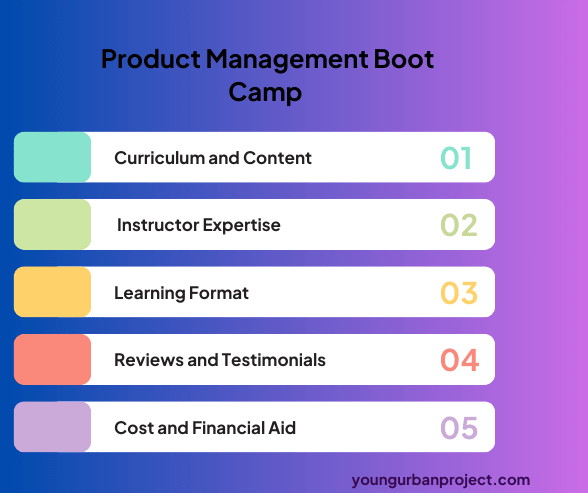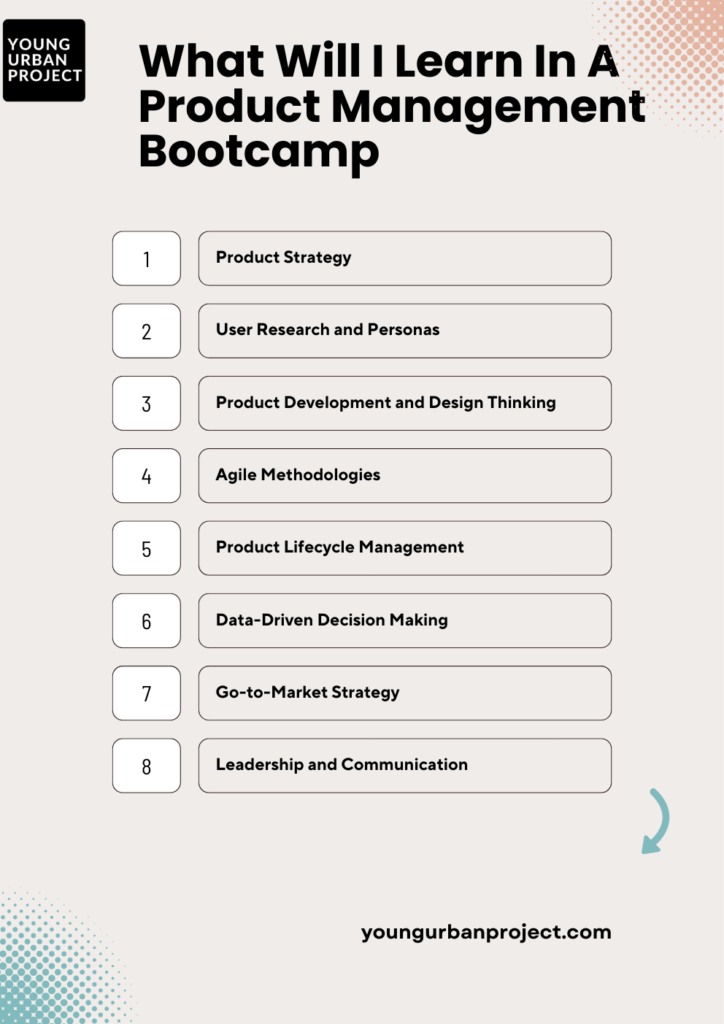In the field of product management, continuous learning and skill development are important. Enrolling in a Product Management Bootcamp is a great way to gain the knowledge and tools needed to succeed. These intensive training programs equip aspiring and experienced product managers with the necessary tools and knowledge to excel in their roles. In this blog post, we will explore the benefits and insights of Product Management Bootcamps, providing a thorough understanding of why they are essential for career growth.
Table of Contents
What Are Product Management Bootcamps?
Product Management Bootcamps are specialized training programs that offer in-depth education on various aspects of product management. These programs typically run for a few weeks to a few months and are designed to provide hands-on experience through practical exercises, real-world projects, and expert-led sessions. Bootcamps cover a wide range of topics, including product strategy, market research, user experience design, and agile methodologies.
Benefits of Product Management Bootcamps
1. Comprehensive Skill Development
Product Management Bootcamps are structured to cover all critical areas of product management. Participants gain a holistic understanding of the product lifecycle, from ideation to launch and beyond. The curriculum often includes:
- Product Strategy: Understanding market needs, defining product vision, and setting goals.
- User Research: Conducting surveys, interviews, and usability testing to gather user insights.
- Design Thinking: Applying creative problem-solving techniques to develop user-centric products.
- Agile Methodologies: Learning how to implement agile practices to enhance productivity and collaboration.
- Data Analysis: Utilizing data to make informed decisions and measure product performance.
2. Hands-On Experience
One of the key advantages of Product Management Bootcamps is the emphasis on practical learning. Participants work on real-world projects, allowing them to apply theoretical knowledge in a practical setting. This hands-on experience is invaluable in building confidence and competence in managing products effectively.
Example: Project-Based Learning
In many bootcamps, participants are assigned projects that mimic real-world scenarios. For instance, they might be tasked with developing a new product concept, conducting market research, creating a prototype, and presenting their findings to a panel of experts. This project-based approach helps participants understand the challenges and intricacies of product management.
3. Networking Opportunities
Product Management Bootcamps attract individuals from diverse backgrounds, including aspiring product managers, experienced professionals, and industry experts. This creates a rich environment for networking and collaboration. Participants can exchange ideas, share experiences, and build connections that can be beneficial for their careers.
Example: Networking Events and Mentorship
Many bootcamps organize networking events, guest lectures, and mentorship programs. These events provide participants with the opportunity to interact with industry leaders and gain insights into best practices and emerging trends. Mentorship from experienced product managers can also offer personalized guidance and career advice.
4. Industry-Relevant Curriculum
The curriculum of Product Management Bootcamps is often designed in collaboration with industry professionals to ensure it is aligned with current market needs and trends. This relevance makes the training highly practical and applicable to real-world scenarios.
Example: Case Studies and Industry Insights
Bootcamps often incorporate case studies and industry insights into their curriculum. Participants analyze successful product launches, study market trends, and learn from the experiences of established companies. This exposure to real-world examples helps them understand the practical application of theoretical concepts.
5. Accelerated Learning
Unlike traditional academic programs, Product Management Bootcamps offer an accelerated learning path. The intensive nature of the training ensures that participants acquire a wealth of knowledge and skills in a relatively short period. This efficiency makes bootcamps an attractive option for those looking to quickly upskill or transition into product management roles.
6. Certification and Recognition
Upon completion of a Product Management Bootcamp, participants often receive a certification that validates their skills and knowledge. This certification can be a valuable addition to their professional portfolio, enhancing their credibility and employability.
Example: Recognized Certifications
Many reputable bootcamps offer certifications that are recognized by industry leaders. For example, General Assembly’s Product Management Bootcamp provides a certificate of completion that is highly regarded in the tech industry. This recognition can give participants a competitive edge in the job market.
Choosing the Right Product Management Bootcamp

When selecting a Product Management Bootcamp, it is essential to consider several factors to ensure it meets your learning needs and career goals.
1. Curriculum and Content
Evaluate the curriculum to ensure it covers the essential topics and skills required for product management. Look for programs that offer a balanced mix of theoretical knowledge and practical experience.
2. Instructor Expertise
The quality of instruction is crucial to the learning experience. Research the background and experience of the instructors to ensure they have relevant industry expertise and a track record of successful product management.
3. Learning Format
Consider the learning format that best suits your schedule and preferences. Some bootcamps offer in-person classes, while others provide online or hybrid options. Choose a format that aligns with your lifestyle and learning preferences.
4. Reviews and Testimonials
Look for reviews and testimonials from past participants to gauge the effectiveness and quality of the bootcamp. Positive feedback and success stories can provide valuable insights into the program’s impact on career development.
5. Cost and Financial Aid
Evaluate the cost of the bootcamp and explore any available financial aid options. Some programs offer scholarships, payment plans, or employer sponsorships to help offset the cost of tuition.
Learn Product Management from top experts from companies like:
BrowserStack, Swiggy, Haptik, OneCard, PayTM and more.

What Will I Learn In A Product Management Bootcamp?
Product Management Bootcamps are becoming increasingly popular as more professionals seek to gain the skills and knowledge necessary to excel in the dynamic field of product management. These intensive programs offer a comprehensive curriculum designed to cover all aspects of product management, from initial concept to product launch and beyond. In this post, we will explore what you can expect to learn in a Product Management Bootcamp, providing a detailed look at the essential topics and skills covered.

Core Curriculum
1. Product Strategy
Product Vision and Roadmapping:
- Learn how to define a clear product vision that aligns with your company’s goals.
- Develop a product roadmap to guide the product’s development and ensure alignment with long-term objectives.
Market Analysis and Competitive Research:
- Conduct thorough market analysis to understand the competitive landscape and identify market opportunities.
- Learn how to perform competitive analysis to benchmark your product against competitors and find areas for differentiation.
2. User Research and Personas
Understanding User Needs:
- Conduct user research through surveys, interviews, and focus groups to gather valuable insights into user needs and preferences.
- Learn how to create detailed user personas to represent different segments of your target audience.
Customer Journey Mapping:
- Map out the customer journey to identify pain points and opportunities for improving the user experience.
- Use this information to inform product development and prioritize features that will enhance user satisfaction.
3. Product Development and Design Thinking
Ideation and Brainstorming:
- Participate in ideation sessions to generate innovative product ideas and solutions.
- Learn brainstorming techniques to foster creativity and collaboration within your team.
Prototyping and Wireframing:
- Create prototypes and wireframes to visualize your product concepts and gather early feedback from stakeholders.
- Learn how to use popular prototyping tools and techniques to bring your ideas to life.
4. Agile Methodologies
Scrum and Kanban:
- Gain a thorough understanding of agile methodologies such as Scrum and Kanban.
- Learn how to implement agile practices to enhance team collaboration, increase productivity, and deliver products more efficiently.
Sprint Planning and Execution:
- Participate in sprint planning sessions to define sprint goals, allocate tasks, and set timelines.
- Learn how to manage sprint execution, track progress, and make necessary adjustments to stay on track.
5. Product Lifecycle Management
From Concept to Launch:
- Understand the product lifecycle stages, from initial concept and development to launch and post-launch.
- Learn how to manage each stage effectively to ensure a successful product launch.
Metrics and Key Performance Indicators (KPIs):
- Identify and track key performance indicators (KPIs) to measure product success and make data-driven decisions.
- Learn how to use metrics to assess product performance, identify areas for improvement, and drive continuous growth.
6. Data-Driven Decision Making
Data Analysis and Interpretation:
- Gain proficiency in data analysis techniques to gather and interpret data from various sources.
- Learn how to use data to inform product decisions, optimize features, and enhance the user experience.
A/B Testing and Experimentation:
- Conduct A/B testing to evaluate different versions of your product and determine which performs better.
- Learn how to design and run experiments to validate assumptions and make informed decisions.
7. Go-to-Market Strategy
Marketing and Positioning:
- Develop a go-to-market strategy to effectively launch your product and reach your target audience.
- Learn how to position your product in the market to differentiate it from competitors and attract customers.
Sales and Distribution Channels:
- Understand the various sales and distribution channels available to reach your customers.
- Learn how to choose the right channels to maximize your product’s reach and impact.
8. Leadership and Communication
Stakeholder Management:
- Learn how to manage and communicate with stakeholders effectively, including executives, team members, and customers.
- Develop skills to present your product vision, gather feedback, and build consensus among stakeholders.
Team Collaboration and Leadership:
- Gain leadership skills to inspire and motivate your team, foster a collaborative environment, and drive product success.
- Learn how to manage cross-functional teams, resolve conflicts, and ensure alignment toward common goals.
Conclusion
Product Management Bootcamps offer a comprehensive and practical approach to learning product management. With benefits such as hands-on experience, networking opportunities, industry-relevant curriculum, and accelerated learning, these bootcamps are an excellent choice for anyone looking to advance their career in product management. By carefully selecting the right program, participants can gain the skills and knowledge needed to excel in this dynamic and competitive field.
Investing in a Product Management Bootcamp can be a transformative step toward achieving professional success and staying ahead in the ever-evolving landscape of product management.

